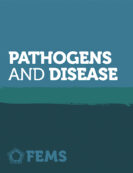FEMS Microbiology Ecology Poster Prize Winner: Jixing Wan
We send our congratulations to Jixing Wan, who won one of the Poster Prizes at Dehalocon 2021, sponsored by FEMS Microbiology Ecology.
 The Third International Conference on Anaerobic Biological Dehalogenation (Dehalocon 2021) was held in Italy between 27-30 September 2021.
The Third International Conference on Anaerobic Biological Dehalogenation (Dehalocon 2021) was held in Italy between 27-30 September 2021.
Read our interview with Jixing about his research below:
What is your current position, and what was your scientific journey to get there?
I am currently a Ph. D. student in the Department of Environmental Engineering at Zhejiang University (China). The topic of my PhD is the influence of humic acids on dechlorination of chlorinated pollutants by Dehalococcoides strains. I used to be a visiting PhD student in the Anaerobes Group in the Department of Environmental Biotechnology at the Helmholtz Centre for Environmental Research – UFZ (Germany). That was quite helpful for my research.”
Could you describe the research your poster covered?
The work I showed in the e-poster at DehaloCon was on the effect of humic acids on perchloroethene dechlorination by Dehalococcoides strains under anaerobic conditions. We investigated the dechlorination of perchloroethene with or without humic acids. Both in mixed cultures containing Dehalococcoides and pure culture of Dehalococcoides strain CBDB1, the dechlorination was accelerated by humic acids. But the quinones, which used to be considered as model substance of humic acids, had a negative effect on the dechlorination. To study the effect in more detail, enzymatic activity tests were carried out. We found that humic acids led to an increase of the dehalogenase enzyme activity independently of the substrate (perchloroethene or 1,2,3,4-tetrachlorobenzene) used. We hope that our results could help to reveal mechanisms other than using quinones as electron shuttle.”
What do you hope to focus your research on in the future?
In the future, I will still focous on this work until I figure out the mechanisms. I hope this will not be the end of this research line and people can develop several methods that could efficiently degrade halogenated pollutants.”
–
We use income from the FEMS Journals to fund grants, awards, and projects, and to support our knowledge sharing events and initiatives. Consider publishing your research with our journals to help the global microbiology community.
All but one of the FEMS journals are now fully open access (OA), with one journal, FEMS Microbiology Letters remaining a subscription journal with free-to-publish and OA options. Open access is key to supporting the FEMS mission of disseminating high quality research as widely as possible: when high quality, peer reviewed sound science is open access, anyone, anywhere in the world with an internet connection, can read it.







